
A RAY BRADBURY REMEMBRANCE
by Steve Vertlieb and Roger Hall
Ray Bradbury at his home in Los Angeles
(photo by Danny Tuffs, Getty Images)

Please help support
Film Music Review
Order music books, CDs, DVDs at the
I SING BRADBURY ELECTRIC:
A LOVING, PERSONAL REMEMBRANCE
By Steve VertliebHe was a kindly, gentle soul who lived among us for a seeming eternity. But even eternity is finite. He was justifiably numbered among the most influential writers of the twentieth century. Among the limitless vistas of science fiction and fantasy he was, perhaps, second only in literary significance to H.G. Wells who briefly shared the last century with him. Ray Bradbury was, above all else, the poet laureate of speculative fiction. He shared with Ernest Hemingway the simplicity of phrase inspired by genius. No more legendary literary figure ever claimed Earth as his home, and yet Ray Bradbury was a childlike gargantuan whose life and artistry were shaped by the wonder and innocence of curiosity and tender imagination.
He was born into a world of rocket ships and monsters, a universe traversed by BUCK ROGERS, FLASH GORDON, FRANKENSTEIN, DRACULA, and a miraculous primordial ape called KING KONG. His boyhood was transformed by the promise of distant worlds and stranger creatures whose outward malevolence masked secret torment, the sadness of being deemed somehow different.
Ray Douglas Bradbury was born in Waukegan, Illinois (a home he shared with Jack Benny) on August 22nd, 1920. From birth he shared an affinity with the magical realm of motion pictures. His middle name was dedicated to the imagery of screen swashbuckler Douglas Fairbanks, and so Ray always knew that his spiritual ancestors consisted of pirates and colorful masked swordsmen. Coming of age during America’s great Depression, the gregarious youth was lifted by the seat of his pants by silken images painted in celluloid. His heroes consisted not only of daring cavaliers such as Fairbanks, but by the pervasively exotic characterizations of Lon Chaney Sr., Boris Karloff and Bela Lugosi. The mystic lure of far away worlds beckoned the impressionable adolescent with the promise of tomorrow, while monstrous cinematic cadavers and rockets to Mars replaced the mundane scenery of a Depression stricken America.
As sympathetic souls and kindred spirits came together in pre-destined unison, Bradbury found himself drawn to the early worlds of science fiction, fantasy, pulp fandom and, together with fellow teenagers Ray Harryhausen and Forrest James Ackerman, began their journey of discovery, forming what has come to be recognized as “first fandom,” in pursuit of creative profit and recognition. Bradbury would later state that he owed everything to Forry Ackerman who sold his first published story. The third member of the imaginative trio, Ray Harryhausen, formalized their creative partnership with the visual realization of Bradbury’s short story “The Fog Horn.” Published in a celebrated issue of The Saturday Evening Post, the short story concerning a sea beast consumed by the tantalizing image of an isolated light house, became the basis for Harryhausen’s first solo screen effort, THE BEAST FROM 20,000 FATHOMS.
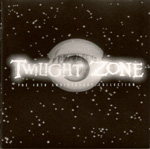
Rod Serling encouraged the celebrated writer to join his literary enclave at CBS Television as the decade reached its conclusion and, while Bradbury submitted several scripts to Serling’s classic science fiction/fantasy anthology series, THE TWILIGHT ZONE, only one was aired as a part of the series. “I Sing The Body Electric,” inspired by Walt Whitman’s famous poem, served as the basis for a Bradbury story in which an electric grandmother is hired by a wealthy widower to work as his children’s nanny. The episode aired as a part of the series on May 18th, 1962 and was later included in a famous Bradbury anthology of the same name published in 1969. While this remains the only episode of the series penned by Bradbury, Serling managed to include an affectionate reference to the writer in his own melancholy tale ("Walking Distance") of an advertising executive on the verge of a nervous breakdown, coming home once more to the small town in which he had spent his boyhood. As Martin Sloan (Gig Young) walks along the streets of Homewood, he makes a casual reference to the Bradbury house standing prominently in his gaze. Homewood sweetly represented small town Americana from which both writers had migrated.
Ray Bradbury turned his adolescent energy and enthusiasm into poetic imagery, and brought a human face to Man’s exploration of the stars. When Neil Armstrong took his first small steps upon the lunar landscape in July,1969, generating a giant leap of faith for all Mankind, Bradbury’s frustration over the lack of excitement shown by the television networks covering the monumental story exploded into headlines, and a memorable tirade by the world’s most eloquent innocent. Bradbury sat solemn and quiet as a guest on a network Lunar themed telecast, struggling to fill time with inanity after insanity. Unable to contain his rage at the proliferation of stupidity filling the national airwaves, the child in a man’s body rose to his feet…outraged by the lack of understanding and exhilaration being exhibited by David Frost and his disinterested panel of guests…and threatened to walk off of the live telecast. His contempt for the bland assemblage of guests apparent, Bradbury admonished them as he would a poor student in the gaze of a disappointed teacher. “This is the greatest night in the history of the world,” he raged. The lack of excitement over this cherished, awe inspiring moment in time, was just too much for this child of wonder either to accept or to absorb. The moment that Ray, and millions of children around the world, had dreamt of and imagined since BUCK ROGERS and SUPERMAN had first flown into space some thirty years earlier was finally here. That these simple, uninspired talk show guests were consumed with themselves, rather than this extraordinary moment of mortal achievement and exploration, was more than Bradbury could endure.
Like millions of imaginative children inhabiting Bradbury’s world, I revered his name and legend. Ray Bradbury signified everything I’d ever dreamt of or aspired to.
As a quiet, introspective boy growing up in Philadelphia during the nineteen fifties, I became a poster child for what would one day become known as “A Monster Kid” -- a generation of “baby boomers” weened on, and inspired by, television, the huge monster movie craze of the fifties, and the introduction of a genre movie magazine with the unlikely name of Famous Monsters of Filmland. The progenitor of this magical publication was none other than the editor who had first brought Ray Bradbury to the attention of publishers. Forrest J Ackerman, or as he was known to his millions of adoring children, “Uncle Forry.”
Forry was the Hans Christian Anderson of science fiction, fantasy, and horror, a Walt Disney father figure who, like the proverbial “Pan,” would lure willing children to worlds and concepts beyond the stars, filling their imaginations with inspirational promise and invitation. He was a joyous Pied Piper who, together with his boyhood friends, Ray Bradbury and Ray Harryhausen, would cause generation after generation of creative youth to embrace their dreams, and create their own fantastic lives and careers. Steven Spielberg and George Lucas were only two of the many artists who found their singular paths among the clouds inhabited by Bradbury, Harryhausen, and Ackerman.
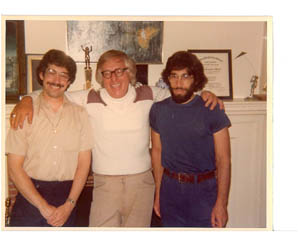
Ray Bradbury with Steve and Erwin Vertlieb
It was during the wonderful Summer months of 1974 that I traveled for the first time to Los Angeles, and came face to face with the land of fantasies, dreams, imagination, and motion pictures that had so consumed and mesmerized my own impressionable childhood. I was like the proverbial kid in the candy store. Everywhere I turned represented the reflection of my own childhood longing and wanderings.
Among my friends of the period was composer and orchestrator John Morgan. John announced one afternoon that he had received an invitation to Ray Bradbury’s house that evening, and he wondered if my brother Erwin and I would like to join him for the royal summons. I swallowed my singular exhilaration, and excitedly accepted his generous invitation. Bradbury’s residence was a large yellow structure in a quiet residential neighborhood. We nervously climbed the outer steps and rang the door bell. As the door opened, Ray greeted us personally and ushered the three of us into his living room. I was both thrilled and frightened, for here within my gaze was the legendary writer smiling at me and extending his hand. His hands, I remember, were very large and inviting and I became lost inside their welcome grasp. Ray asked me about my own career, and I told him that I was a published writer and minor film historian. My day job was, I explained, a film editor at a Philadelphia television station.
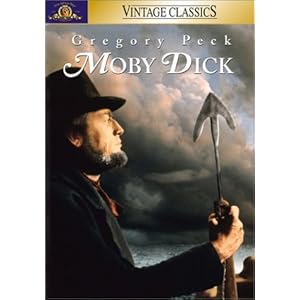
He asked if I knew that he had written the screen play for John Huston’s magnificent 1956 production of MOBY DICK. I assured him that I had. He was very proud of the gift that Huston had given him after the picture had been released. It was a 16 millimeter Technicolor print of the Warner Bros. release given him personally by the director. Ray was like a little kid proudly showing off his Hopalong Cassidy pistol. He asked if I’d like to see a few minutes of the film. I said yes, of course, and he ran to find the print. His joy was infectious as I watched him delicately thread the projector and share his treasure with us.
As the film began to un spool on the screen in his living room I could see that the print was immaculate. My film editor’s eye, however, noticed just the beginnings of an emulsion scratch in the otherwise gorgeous Technicolor print. I took my life in my hands, and asked Ray to stop the film for a moment. I don’t know if it was courage on my part or youthful arrogance. It’s difficult now to say which. Ray looked at me with a puzzled expression. I asked him if he ever cleaned his projector “gate.” He asked what I meant. I said “Ray, do you have a box of cue tips and some Isopropyl Alcohol?” Here was one of the most important writers of the twentieth century going dutifully to fetch a box of cue tips for this young upstart transgressing his hospitality. I honestly thought he would lift me bodily from my chair, and hurl me out the door to the street below. Instead, like the gentle soul he was, he went out into another room to bring what I had requested. I took a cue tip from the box he had handed me and immersed it in the accompanying bottle of alcohol. I showed him how to clean the “gate” of the projector in the areas that came into contact with the film print and assured him that this procedure would help to keep his beloved Technicolor print from being torn and permanently scratched. He thanked me for this simple lesson in film maintenance, and appeared grateful, but I was thoroughly convinced at the time that I would soon be black listed all over Hollywood, and forbidden from ever encountering or confronting this splendid ICE CREAM MAN again. That was Ray. He was just a big kid…a gentle, enthusiastic child with the talent and intellect of a genius.
During that same trip out West we had the unique opportunity to sit in the audience with Ray and his wife for a live, small theater production of FAHRENHEIT 451. Ray told me that he adored Bernard Herrmann’s original score for the Truffaut film version of his famous novel and, at his insistence, the small theater troupe used excerpts from the Herrmann recording of his score for London Phase 4 Records, with the composer conducting The London Philharmonic Orchestra. The experience was surreal.
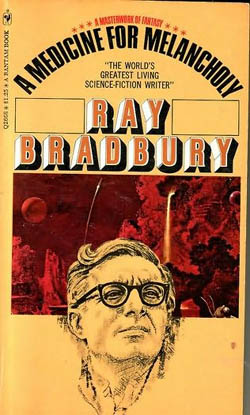
After that, Ray and I maintained a sporadic, yet steady correspondence for the rest of his life. I remember running into him at one of Forry Ackerman’s Famous Monsters Of Filmland conventions in Virginia in 1993. I hadn’t seen Ray in years. He was surrounded, as he always was, by a burgeoning crowd of awe struck fans. I approached him and asked if he remembered an arrogant young man some twenty years earlier who had had the temerity, in his own living room, to lecture him on the care and feeding of his 16 millimeter movie projector. He looked up at me from the hotel couch on which he was sitting and grinned somewhat impishly, pointing his finger in my direction. “Was that YOU?” I assured him that I was, indeed, that brazen young lad. We both chuckled over the recollection of that embarrassing episode so many years earlier. He might have cringed at my appearance, but he didn’t. He simply chuckled in delight. He was A MEDICINE FOR MELANCHOLY.
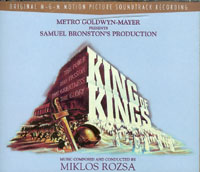
Among the many ties that bound us together was Ray’s passionate interest in symphonic motion picture music written for the screen. We shared a love for the music of such composers as Bernard Herrmann, Miklos Rozsa, and Max Steiner among others. I had known Miklos Rozsa as a friend for nearly thirty years, and Ray not only admired his music, but had worked together with the composer during the filming of KING OF KINGS for MGM in 1961. Rozsa had won a richly deserved Oscar for his magnificent 1959 score for Metro-Goldwyn- Mayer’s BEN-HUR, and so was asked to write the music for the studio’s early sixties remake of the original 1927 Cecil B. DeMille silent classic. Ray was hired by Metro to write the narration spoken by Orson Welles scattered throughout the picture, and attended some of the recording sessions with Rozsa.
In 2007 the historic Castro Theater in San Francisco was preparing a special film festival honoring the work of the legendary composer, and I was asked to choose the films for the presentation, write the liner notes for the program, and co-host the festival. As it turned out, the Miklos Rozsa film festival became a major San Francisco event in late 2007 and early 2008 with seventeen motion pictures presented to packed houses over a nine day period. The composer’s daughter, Juliet Rozsa, along with his granddaughters Nicci and Ariana, all drove in from Los Angeles and appeared with me on stage during the introductions. I was honored to read proclamations from both the Mayor of San Francisco, as well as the Hungarian Ambassador to The United States. However, the introduction that thrilled me the most was one written expressly for the event by Ray Bradbury.
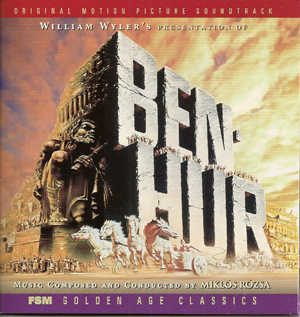
Knowing Ray’s love for film music, I wrote him about the festival. He wrote me back asking if he might contribute his own written introduction to the festival. I was honored to accept his lovely request. After all, who was I to say say “no” to Ray Bradbury. Consequently, I felt a tingle of excitement as I read Ray’s brief, loving words from the stage to an audience of some seven hundred people just prior to my “live” interview with Juliet Rozsa, and a 35 millimeter screening of the composer’s masterpiece, BEN-HUR.
Over the years that followed I continued to correspond with Ray, both my mail and through the internet. Each Christmas would bring Ray’s newest holiday poetry which seemed to arrive not through conventional mail delivery but, rather, upon wings of angels within a snow covered sleigh. On one memorable occasion, after sending him an article I’d written pertaining to the science fiction genre we both so adored, he wrote me a lovely note thanking me for continuing to write about the worlds of fantasy and science fiction. He felt a singular obligation to keep the faith, so to speak, through his own place in literary history, and wanted to thank me, as well, for continuing to carry the torch along with him. Despite his advancing years and assorted health problems, which included a debilitating stroke in 1999, he was still the same little boy who had discovered the wonder of other worlds and galaxies so many decades before. Like Ray Harryhausen and Forry Ackerman, with whom he had shared his first spiritual journeys to outer space, he wrote “Steve…You’re a good pal.” I nearly cried when I read that, and wanted to reach out and hug this gentle soul whose life and work had so touched and impacted my own.
Ray continued to find wonder in the music of the movies and particularly loved Jerry Goldsmith’s valiant score for THE WIND AND THE LION. His affection for Goldsmith’s exhilarating musical themes for the romantic Sean Connery adventure film inspired his own work, and he proudly acknowledged his debt to the composer’s symphonic poetry in creating NOW AND FOREVER: SOMEWHERE A BAND IS PLAYING , published by William Morrow Company in 2007.
I published my own tribute to Jerry Goldsmith and his music for another epic score, FIRST KNIGHT, in June, 2011, at Film Music Review, and discussed Ray’s love for that earlier Goldsmith music. I sent the article to Ray’s beloved daughter, Alexandra (Zee) shortly after its online publication. I think that one of the greatest thrills of my life, perhaps, was when Zee took my work along with her during a trip to her dad’s home a few weeks later, and read it to him. She wrote me that he smiled from ear to ear and offered his own enthusiastic comments as she read him my words about the Goldsmith music.
Several weeks later I received a small parcel from Ray in the mail. On the face of the large white envelope were two postage stamps honoring Edgar Allan Poe.
Next to the stamps, Ray had drawn an arrow pointing toward Poe, and written in big letters “My Pa.”
Inside the envelope were a photograph of Ray standing next to a painting of Poe, along with a handwritten note which read…
Steve:
Thanks for “Mickey” (Miklos Rozsa)
4E (Forry Ackerman)
Xmas
& ME!Love,
Ray
I got to see Ray a couple of more times, and those visits were the most wonderful love fests that I could have imagined. After the death of his lifelong friend friend Forry Ackerman, I sent Ray my Rondo nominated tribute to my own forty seven year friendship with Uncle Forry and, as I sat at his side, Ray said “I owe him everything.” I visited Ray shortly after his ninetieth birthday in late August, 2010. He was busily involved in numerous tributes, interviews and appearances honoring his birthday, but he told Zee to please somehow fit me into his schedule…and so I traveled with my little brother Erwin to Ray’s house to spend a loving hour at his feet. It was difficult for him to speak due to ill health, but he was obviously happy to see us and felt invigorated by our visit. I continued to feel astonished that this world renowned literary figure, this giant of a writer, was still living within the confines of the very same humble home he’d shared with an unsuspecting, quiet residential neighborhood for some fifty years. When I asked him about it, he told me that he’d raised his family and enjoyed much of his fame and success in his beloved house. Why would he ever wish to leave it?
In January, 2010, I discovered that my own health had been dramatically failing and that I would need major open heart surgery quite soon if I were to survive. In mid February of that year we scheduled surgery for a few weeks hence. I wrote Ray of my impending procedure, and he playfully instructed Zee to write me of the poetic irony of my requiring heart surgery right around Valentine’s Day. He further instructed her to tell me that he would not allow me to die. Who was I to contradict Ray Bradbury?
I was able to visit Ray one more time during the closing days of August, 2011. Once again, the demands on his time had become nearly impossible, as the world around him was beginning to understand and respect the significance and singular importance of the solitary inspiration who had so profoundly influenced the better part of their lives. Once again, Ray grew excited at the prospect of my impending visit and asked Zee to please arrange his schedule so that he might find time to see me. When Zee wrote me that “Dad” was excited about seeing me during my visit to Los Angeles, I humbly pondered the reasons why Ray Bradbury…this living legend…would grow excited over seeing me, of all people. I think the reason for his enthusiasm had little to do with me personally. It was just that Ray had never truly grown up. He was still the eternal innocent…still the little boy possessed of childlike awe and wonder who was eager to stop time and simply visit with an old “pal.”
Ray had just turned ninety-one and was visibly excited over the news that a film production company had just purchased the rights to his novel Dandelion Wine. As we entered the house, Zee told me that her dad was thrilled by the report and that he couldn’t wait to tell me about it. When I entered his den I found him in good spirits and quite animated. We talked of the sale, and of our nearly forty year friendship. As the time wore on, and Ray was growing tired, I grew unusually sentimental as we were to preparing to leave. I filled up with tears as I told Ray how deeply I loved him, and how he had so profoundly impacted not only my life, but the lives of literally millions of friends and admirers all over the world who loved him as well, and owed him so very much. I arose from my chair and embraced this frail, gentle soul. I kissed him on his cheek, and told him how much he meant to me. He said “I love you, too, Steve” as each of us smiled and fought back the inevitable tears.
As we left the modest home on Cheviot Drive, I turned once more to see the façade and stood there for a moment, deep in thought and contemplation. As we got into the car, I said to Erwin “I have a terrible feeling that this is the last time we’ll ever see Ray.”
The remaining months of 2011 slipped quickly away. A new year was dawning but, with it, came new health concerns…not only for me, but for my beloved mom who had celebrated her one hundredth birthday six months earlier. In the early morning hours of February 1st, 2012, I received the dreaded telephone call that my mother had passed away. Among the treasured notes and letters of condolence that I received was a touching E-mail from Ray and Zee Bradbury expressing their sadness over the loss of my mom.
Nostalgia for things past and for a simpler time, perhaps, has become a common thread shared by so many so called “baby boomers.” In December, 2011, I was interviewed in my home for two hours by film director Robert Tinnell and a camera crew for a new film documentary concerning the “Monster Kid” phenomenon inspired by Forrest J Ackerman, his groundbreaking Famous Monsters Of Filmland Magazine, and the hugely popular, affectionately remembered monster movie craze of the 1950’s. Such luminaries as Steven Spielberg and George Lucas owe their careers to the phenomenon, as do such decidedly minor players as myself. While the film has not yet been completed, the producers released a theatrical trailer promoting their forthcoming documentary in the Spring. I sent the link for the trailer to Zee Bradbury, inspiring her to write back that “Dad should really be a part of this.” I telephoned Bob Tinnell on his mobile phone while he was driving in West Virginia to let him know that Ray Bradbury was interested in appearing in his film. He pulled off to the side of the road in excitement over the news. I put Bob in touch with Zee, and they arranged for Bob to come and visit Ray either in late May or early June, 2012, to interview him for the film.
In the meantime, I had spoken with Zee about my own impending return to Los Angeles in late August, 2012 and, as usual, she wrote back that her dad was excited about seeing me, and had asked her to re-arrange his schedule so that he might find the time to do so. While at work on the morning of Wednesday, June 6th, I received an E-Mail from Bob Tinnell letting me know that Ray had passed away during the night before at his home in Los Angeles. I stared at my Blackberry phone in stunned silence, unable to fully grasp the news. Ray Bradbury was gone. I began to cry. My lifelong hero and friend had died. I would no longer behold his wonderful face and childlike smile, nor would I ever again find my own hands lost in his. He had joined Forry and his other pals in what must surely be Science Fiction Heaven. Ray shared our lives and existence for an all too brief and shining moment in eternity, and now he had departed, leaving us to face a world sadly dreary in his absence.
Ray has found peace in another realm of immortality, having joined THE GHOSTS OF FOREVER, and yet his work lives on beyond his fabled physical presence, and we shall continue to sing Bradbury Electric in joyful celebration and chorus for the remainder of our own solitary sojourn upon this wondrous sphere.
-- Steve Vertlieb, June 2012
Contributing writer - Film Music Review
Some of the images in this remembrance are from the author's personal collection. Others are from online sources and no copyright infringement is intended or implied.
Ray Bradbury's classic book, FAHRENHEIT 451, was filmed in 1966, directed by Francois Truffaut and starring Oskar Werner and Julie Christie. It is available on a recommended DVD, with very good information about Bernard Herrmann's great score.
This Tribute Film Classics CD was the winner of a
Sammy Film Music Award in 2008.
FAHRENHEIT 451 is listed on the100 Essential Film Scores of the 20th Century
Read about the composer of the FAHRENHEIT 451 film score at this link:
Bernard Herrmann: A Centennial Tribute
CD Review:
36 Tracks (Total Time = 69:11)
Music composed and conducted by Stanley Myers. Additional Electronic Music Composed, Performed and Recorded by Richard Harvey (not included on this album).
Produced by Christopher Landry. Executive Producers: Nicholas Myers and Luc Van de Ven. Music recorded and mixed by Graham Harris. Digitally edited and remastered by James Nelson. Album Design and Liner Notes by Christopher Landry. Distributed by Prometheus Records, Kon Astridlaan 171, 2800 Mechelen, Belgium.
Airstrip One AOP 003 (limited edition - 3,000 copies)
Rating: ***1/2
After listening to other less than welcome sci-fi or horror soundtracks of the 1980s, such as RE-ANIMATOR, this soundtrack for a three part TV series came as a pleasant surprise. Unlike the others, THE MARTIAN CHRONICLES is chock full of marvelous lyrical themes and is beautifully recorded and remastered on this Airstrip One release. This label has released two other CDs: THE DUELLISTS & THE RIDDLE OF THE SANDS ( Howard Blake) and NINETEEN EIGHTY-FOUR ( Dominic Muldowney).
I recently had the good fortune of watching the TV series once again and though I think it drags a bit and sometimes very awkward in its scenic production, the soundtrack keeps things moving along and only used where most needed. I really think listening to this soundtrack is even better than watching the TV series.
I'll offer a few examples of this great soundtrack...
First off is the "Prologue" (2:20), with its subtle use of woodwinds and brass. This is not one of those bombastic kind of openings. Instead it subtledly suggests what lies ahead in this classic tale by sci-fi master, Ray Bradbury. The second track is "The Martian Chronicles Theme" (2:04) and is played on solo flute, which provides a lyrical quality and has a Native American quality, perhaps to echo the pioneering spirit of the Martian explorers. This is a simple yet stunning theme and it returns at key moments in the continuing saga, like tracks 11 (" Col. Wilder's Promise") and 13 (" Martian City"). Various unusual instrumental combinations are used throughout this score, including folklike instruments such as the panpipes (as on the pensive "Memories" - track 32, 1:07).
Mention should also be made of the more unusual music themes such as track 12 ("Spender's Anger/One of Our Own"). This stronly accented theme is heard again on track 14 ("Hunting Spender/ Is This How It Will Be?").
The lavish full color CD booklet is extremely well designed and contains a wealth of information. Icluded are: a short introduction by the film's director, Michael Anderson; descriptions of the three parts of the series; the designer's task and making of THE MARTIAN CHRONICLES; a personal view by one of the cast's actors (Bernie Casey); a bio sketch of Stanley Myers; and a fond tribute - "Remembering Stanley" by Hans Zimmer, who was Myer's assistant for seven years. Zimmer's comments are worth quoting:
"Stanley was the master. His music was always elegant and witty. He wrote real melodies - that most elusive commodity - heart-wrenchingly beautiful and emotional, never sentimental... Stanley was obviously a generous teacher. So whenever I get something right, it is usually based on something I learned from him."
Zimmer surprisingly admits that - "All the horrible music I've done is entirely of my doing."
He ends by writing about Myers - "His music is still so magnificent and maybe this album will help to remind people of that."
Then there is a different view offered by Ray Bradbury, who is quoted as saying (probably jokingly): "The film was so boring I don't remember the music. Was it any good?" You bet it was, Mr. Bradbury!
This is a wonderful, well produced TV soundtrack and should be in every sci-fi collector's library.
I highly recommend it.
-- Roger Hall, 15 April 2003
More reviews are available from this and other years
on the computer disc:
© 2012 PineTree Productions. All Rights Reserved. Contact: pinetreepro@aol.comContact






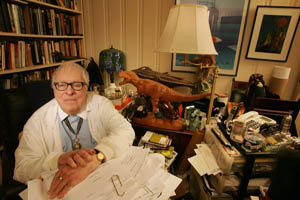
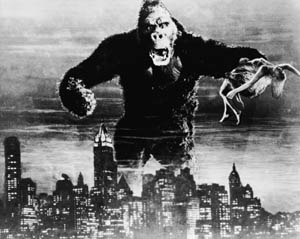

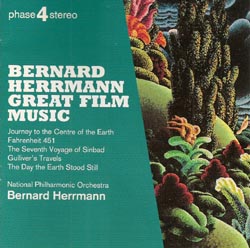
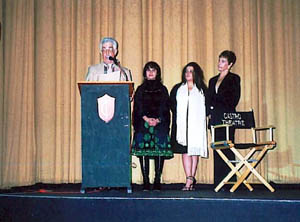
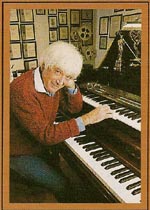
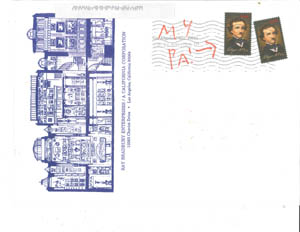
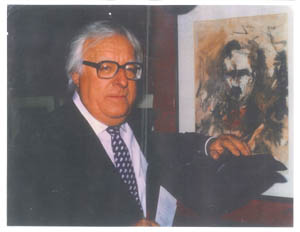
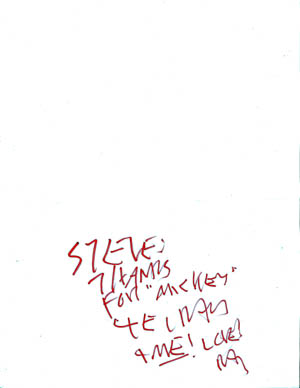
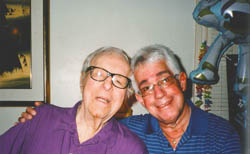
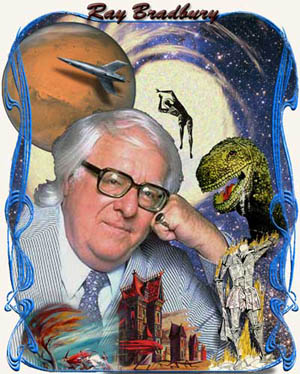
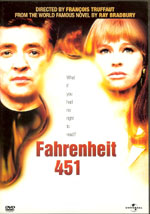
.jpg)
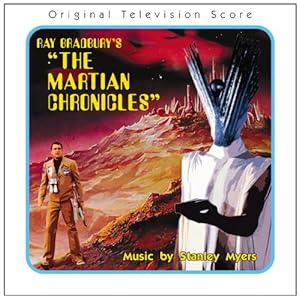
.jpg)